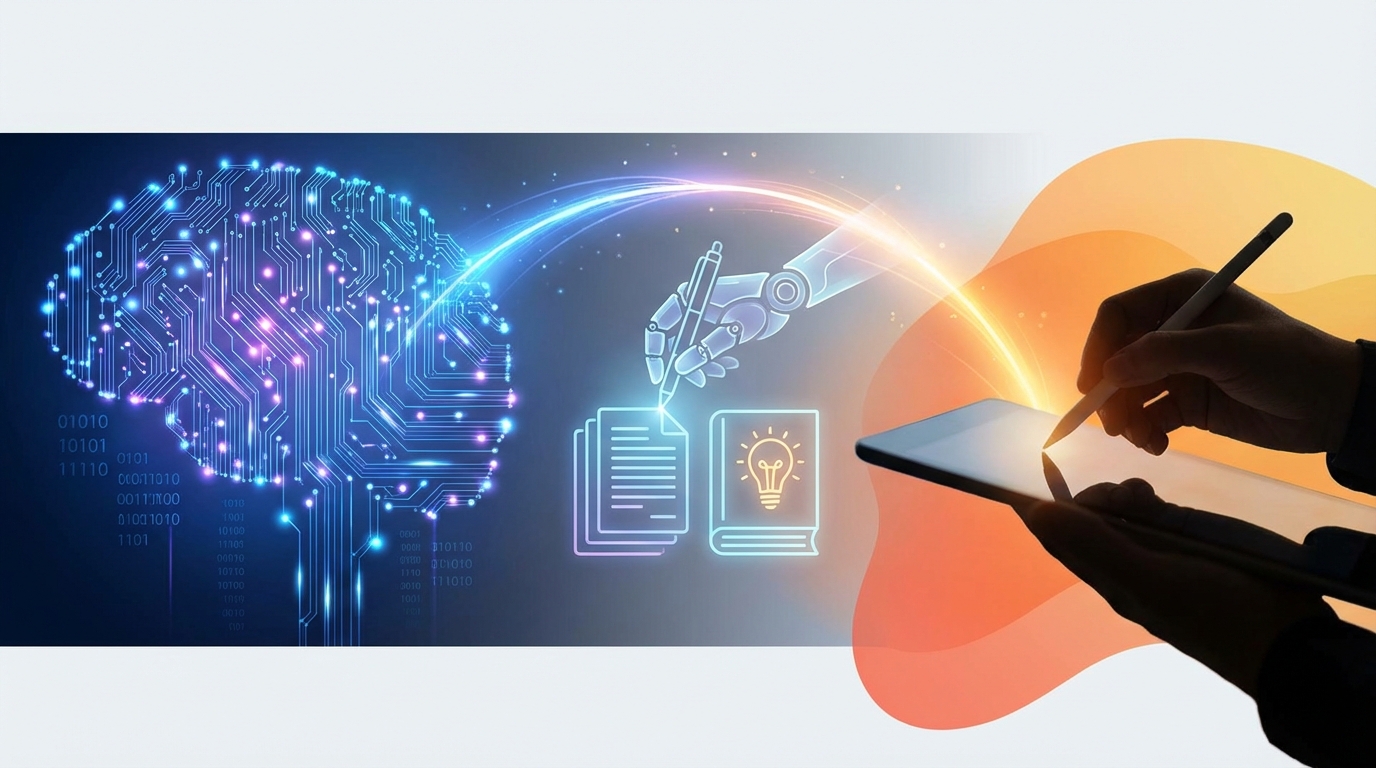
L'IA nella scrittura può superare la scrittura umana?
Sebbene gli strumenti di scrittura basati sull'IA abbiano mostrato significativi progressi, il consenso attuale tra gli esperti è che è improbabile che superino gli scrittori umani in termini di creatività e della comprensione sfumata che l'espressione umana porta alla scrittura. I contenuti generati dall'IA possono essere rapidi e voluminosi, ma potrebbero mancare della gamma diversificata e della profondità che gli scrittori umani raggiungono.
Numerose fonti sostengono che, nonostante la capacità dell'IA di assistere in alcuni aspetti del processo di scrittura o generare contenuti in contesti specifici, non può replicare completamente il tocco umano. L'IA può produrre contenuti che sembrano plausibili, ma a volte possono essere errati, privi di senso o mancare dei livelli di significato che gli autori umani forniscono tipicamente.
Gli strumenti di IA hanno le loro limitazioni, come la produzione di contenuti che suonano credibili ma possono includere errori. Per ora, l'IA è uno strumento aggiuntivo che può aiutare gli scrittori con vari compiti come generare idee, creare schemi o controllare la grammatica, piuttosto che un sostituto per gli scrittori umani.
In conclusione, sebbene l'IA possa essere in grado di scrivere contenuti accettabili e persino assistere nel processo di scrittura, è improbabile che a questo stadio superi il livello di creatività, pensiero critico e profondità emotiva che gli scrittori umani portano al loro lavoro.

I contenuti generati dall'IA possono effettivamente essere più efficienti della scrittura umana in alcuni aspetti e contesti. Poiché l'IA può elaborare e generare grandi volumi di contenuti rapidamente, può aiutare a risparmiare tempo e risorse che potrebbero essere consumate dagli sforzi umani nel compiere gli stessi compiti. È particolarmente efficiente per contenuti ripetitivi o basati sui dati in cui velocità e volume sono cruciali, come la generazione di rapporti, riassunti o persino prime bozze di articoli standard.
Tuttavia, l'efficienza non riguarda solo la velocità; implica anche la qualità e lo scopo del contenuto. L'IA potrebbe mancare della capacità di comprendere appieno il contesto, l'emozione e le sottigliezze del linguaggio che vengono naturali agli esseri umani. Pertanto, mentre i contenuti generati dall'IA potrebbero essere efficienti in termini di velocità di produzione e soddisfacimento delle esigenze informative di base, potrebbero non essere sempre sufficienti per contenuti che richiedono una profonda comprensione, creatività e pensiero complesso—un dominio in cui gli scrittori umani eccellono.
Ad esempio, contenuti come la poesia, la scrittura di narrativa sfumata, saggi persuasivi che richiedono un appello emotivo, o analisi complesse potrebbero beneficiare maggiormente del tocco umano per connettersi con i lettori a un livello più profondo. È anche importante notare che anche i contenuti generati in modo efficiente dall'IA richiedono spesso supervisione umana per la verifica dei fatti, l'editing e per garantire che il prodotto finale soddisfi la qualità e la rilevanza desiderate.
Quindi, i contenuti generati dall'IA possono essere più efficienti in particolari scenari, specialmente quando utilizzati come strumento per aumentare la scrittura umana piuttosto che sostituirla.
I contenuti generati dall'IA possono offrire vantaggi distinti quando si tratta di risparmiare tempo e risorse, soprattutto se confrontati con il processo di scrittura umana più tradizionale e laborioso. Ecco alcuni modi in cui l'IA può semplificare la creazione di contenuti:
- Produzione Rapida: Gli strumenti di scrittura basati sull'IA possono generare contenuti a un ritmo rapido. Questo rapido turnaround può essere particolarmente vantaggioso per le aziende che devono produrre grandi quantità di materiale scritto in breve tempo.
- Efficienza dei Costi: Utilizzare l'IA può essere più conveniente rispetto all'assunzione e alla formazione di scrittori umani, specialmente per compiti di contenuto di routine. Questi risparmi possono essere riallocati ad altre risorse o dipartimenti necessari.
- Produttività 24/7: I sistemi di IA possono lavorare senza sosta senza affaticarsi, garantendo una generazione continua di contenuti che non dipende dalle ore lavorative umane o dalla presenza fisica.
- Scalabilità: Gli strumenti di IA possono aumentare o diminuire la produzione di contenuti in base alla domanda senza la necessità di gestire una forza lavoro più ampia.
- Diversità dei Contenuti: L'IA può produrre diversi tipi di contenuti—da post di blog e articoli a rapporti e riassunti—senza la necessità di ampie istruzioni o formazione sull'argomento.
- Riduzione degli Errori Umani: Sebbene i contenuti generati dall'IA non siano perfetti, possono aiutare a ridurre i tipi di errori che gli esseri umani potrebbero fare a causa dell'affaticamento o della supervisione.
- Coerenza: L'IA può mantenere una voce e uno stile coerenti attraverso vari pezzi di contenuto, il che è essenziale per l'identità e il messaggio del marchio.
- Elaborazione dei Dati: L'IA può analizzare e sintetizzare grandi volumi di dati per l'uso in articoli di ricerca, rapporti di sintesi e articoli, molto più rapidamente di quanto un umano possa fare.
- Capacità Linguistiche: Strumenti di IA avanzati possono scrivere contenuti in più lingue, il che può risparmiare tempo negli sforzi di traduzione e localizzazione.
- Ottimizzazione SEO: Molti strumenti di scrittura basati sull'IA sono dotati di capacità SEO, assicurando che i contenuti che producono siano ottimizzati per il posizionamento sui motori di ricerca, risparmiando così il tempo che altrimenti sarebbe speso nella ricerca e ottimizzazione delle parole chiave.
Tuttavia, mentre l'IA può semplificare molti aspetti della scrittura, la supervisione umana è ancora cruciale per garantire accuratezza, rilevanza e coinvolgimento, particolarmente per contenuti sfumati o altamente creativi. Gli scrittori umani sono anche essenziali per contestualizzare i contenuti, aggiungere intuizioni uniche e garantire che il prodotto finale si allinei al tono e al pubblico desiderati.
Share this article
Related Posts
p>La nuova tendenza della scrittura AI sta davvero rivoluzionando il nostro approccio alle attività di scrittura, rendendo il processo significativamente più facile ed efficiente. Con strumenti come il AI Essay Writer di WriteGo, le persone possono sfruttare il potere dell'intelligenza artificiale per creare saggi, articoli di ricerca e articoli di alta qualità con il minimo sforzo. Questa innovazione non riguarda solo la semplificazione del processo di scrittura; si tratta di migliorare la qual
der_faab3 auto-hide-last-sibling-br">Introduzione: La Rivoluzione della Scrittura AI

